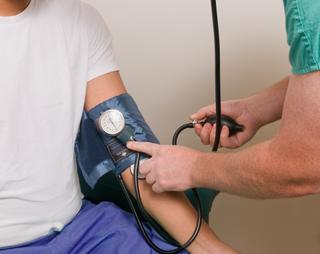What is blood pressure?
When the blood is pumped out of the heart into the body, what is called blood pressure occurs. Blood pressure is a vital process in the body because it controls the flow of oxygen and nutrients to all tissues and organs. Blood pressure is measured in millimeters of mercury (mmHg) and is given as two different values: Systolic and diastolic pressure.
A normal blood pressure value for a healthy adult is usually considered to be around 120/80 mmHg, where the overpressure (systolic pressure) is 120 and the underpressure (diastolic pressure) is 80. This is and is considered to be a standard value that is often used as a reference for a normal blood pressure. It is important to note that variations can occur and that it is not only the numbers that are important, but also whether there is any trend of elevated values over a longer period of time.
Systolic pressure
This is the higher value, also called overpressure, and represents the maximum pressure that occurs in the arteries when the heart beats and pumps blood around the body.
Diastolic pressure
This is the lower value, also called negative pressure, and represents the lowest pressure in the arteries when the heart is at rest between beats, that is, when it is filled with blood before the next contraction.
Why is it important to measure blood pressure?
Blood pressure is one of the body's most important processes that is regulated by a complicated interplay between the autonomic nervous system, hormones and kidney function. By regularly measuring your blood pressure, you can both monitor your health and prevent potential health problems. Blood pressure is affected by several factors, including the heart's pumping power, the amount of circulating blood, the elasticity of the arteries, and total peripheral resistance (the resistance the blood encounters as it flows through the vessels).
High blood pressure, hypertension
High blood pressure, or hypertension, is diagnosed at values around 140/90 mmHg or higher and can be life-threatening for the body in the long term because it can increase the risk of cardiovascular disease, stroke and other health problems. Hypertension does not have to give rise to any clear symptoms in the early stages, which makes it more difficult to detect. Hypertension is a chronic medical condition in which the force of the blood pushing against the walls of the blood vessels is higher than normal.
Symptoms of hypertension
Many people can have hypertension without feeling any specific signs. Over time, however, high blood pressure can create a risk of serious health problems such as cardiovascular disease, stroke and kidney damage. Some individuals may experience headaches, dizziness, or nosebleeds, but the symptoms may not be specific to hypertension and may occur for other reasons. Regular blood pressure checks are essential for early detection and management of hypertension.
Low blood pressure, hypotension
Low blood pressure, or hypotension, can lead to symptoms such as dizziness, fainting and fatigue. There is no exact cutoff for when blood pressure is considered "hypotensive," as it can vary depending on individual factors. In general, a blood pressure lower than 90/60 mmHg is considered hypotension for healthy adults. However, this is a rough guideline and it is important to understand that low blood pressure is not always harmful or causes symptoms.Symptoms of hypotension
Symptoms of hypotension, or low blood pressure, can include dizziness, fainting, and fatigue. Individuals with low blood pressure may sometimes feel unsteady when standing up quickly or changing positions. It is important to note that not everyone with low blood pressure experiences symptoms, and in some cases, low blood pressure may be normal for some people.




















